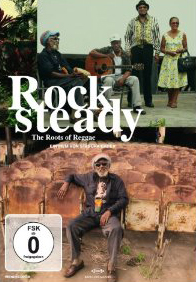In the next few days the film "Rocksteady - The Roots Of Reggae“Premiere in Germany. I looked at it beforehand, not least because I was really excited to see if a good documentary about the music of Jamaica would finally be made. My DVD shelf is full of them dubMost popular films about reggae, mostly amateurish attempts to pay homage to reggae instead of explaining it. The only glorious exception is the BBC documentary “Reggae: The Story Of Jamaican Music”, a two-hour foray into reggae history with great footage from all the decades of our favorite music's short existence, with very precise voice-over and beautiful interviews. But now there is: "Rocksteady - The Roots Of Reggae" and the BBC documentary doesn't exactly get competition on my shelf, but a good addition. In contrast to the BBC, director Stascha Bader's interest is not so much in the accurate communication of historical facts, but rather in the people who breathed life into rock steady in the mid to late 1960s. And it is precisely in this respect that “Rocksteady - The Roots Of Reggae” sometimes seems like a copy of “Buena Vista Social Club”. Here as there, the camera circles the aged musicians, shows them in the studio and on the stage, feasts on their furrowed faces and, with a mischievous wink, shows the old warriors in poses that viewers are normally used to from young stars. And something else inevitably makes me think of Wim Wenders original: We see a Jamaica that, like Cuba, got stuck in the middle of the last century. We see romantically dilapidated places, picturesque ruins of old theaters, places of innocent dancing pleasure, which can resurrect a Jamaica before the fall of man. These are the places where the Rocksteady veterans stand, reminisce about a better time and sing a song. Well, innovative cinema is something different ten years after “Buena Vista Social Club”. But as a friend of reggae's “golden age”, namely the rocksteady era, one likes to overlook the overly conventional form of the film and is happy, Gladstone Anderson, Ken Boothe, Stranger Cole, Marcia Griffith, Rita Marley, Derrik Morgan, Judy To watch Mowatt, Dawn Penn, Leroy Sibbles and many other musicians make music. It never gets boring, because Stascha Bader develops an entertaining dramaturgy through the variety of studio scenes, interviews with the artists (often recorded in their amazingly petty-bourgeois furnished houses), documentary street scenes and footage from the 1960s, an entertaining dramaturgy that the film makes it very entertaining. Equally entertaining are the superbly produced and recorded songs, even if Stascha Bader unfortunately (but understandably) opted for the absolute "mega hits" of Rocksteady, which one is actually a bit tired of. But it doesn't matter. That's all complaining at the highest level. For a reggae documentary, “Rocksteady” is a really great success and a godsend for every reggae connoisseur.
Categories

